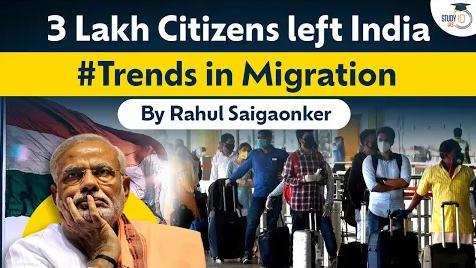Table of Contents
- Analyse and contrast India’s global diasporic movements for pre-Independence phase and post-Independence phase.
The News
- Recently, Union minister of state for home Nityanand Rai informed the parliament that more than 3 lakh individuals renounced Indian citizenship for reasons personal to them and took citizenship in over 120 countries.
- Over 3.92 lakh Indians gave up their citizenship in the last three years and 1.70 lakh of them, the highest, took up American citizenship.
- Note: Over 6.75 lakh Indians had renounced their citizenship between 2015-19.
The News
Citizenship
- Citizenship signifies the relationship between individual and state.
- Citizens are full members of the Indian State and owe allegiance to Indian constitution.
- Citizens enjoy all civil and political rights.
- Note: Citizenship is an idea of exclusion as it excludes non-citizens.
Please Remember
- Citizenship is listed in the Union List of schedule 7 under the Constitution and is under the exclusive jurisdiction of Parliament.
- The Constitution does not define the term ‘citizen’. (Articles 5 to 11 give details of various categories of persons who are entitled to citizenship).
- Articles related to constitution were enforced on November 26, 1949 itself, when the Constitution was adopted.
- The Foreigners Act places a heavy burden on the individual to prove that he/she is not a foreigner.
Citizenship act 1955
Acquisition
Termination
Where have they gone?
Where have they gone?
Where have they gone?
- According to the data, apart from choosing countries such as Singapore (7,046) and Sweden (3,754), many have also renounced their citizenship for Bahrain (170), Angola (2), Iran (21), and Iraq (1) — one person took the citizenship of Burkina Faso in 2021.
- More than 1,400 persons took Chinese citizenship, the data showed, while 48 persons renounced their citizenship for Pakistan’s.
Why do people renounce citizenship?
- The reasons vary widely from country to country, and among socio-economic and ethnic groups. (Note: India does not allow dual citizenship).
- In general, People leave their countries for better jobs and better living conditions.
- As the Indian diaspora around the world has increased in numbers, with newer generations holding passports of other countries, some older Indians are choosing to leave to be with family settled overseas.
- According the Global Wealth Migration Review the reasons listed for migration include:
- Safety of women and children
- Lifestyle factors like climate and pollution
- Financial concerns including taxes
- Better healthcare for families and educational opportunities for children
- To escape oppressive governments
Pre v. Post Independence
- Why migration before Independence?
- Pre-Independence diasporic movement was mostly driven by forced and contractual labour contracts.
- Indentured labour from the Indian subcontinent, particularly during the 19th century, where large numbers of individuals who were forced and tricked into bonded labour and slavery and shipped by the colonial government to places like the Mauritius, La Réunion, the Strait Settlements, Fiji, Natal, South Africa, British Guiana, Trinidad, Suriname, Guadeloupe, Martinique, French Guiana, Jamaica, Belize, St. Lucia, St. Vincent, Grenada, etc.
- Why migration after Independence?
- Post-Independence diasporic community have been leaving India mostly for jobs and higher education. Those who are leaving for jobs not just include skilled labour but also unskilled & semi-skilled labour especially in West Asia.
Push Pull Factors for Diaspora
Push Pull Factors for Diaspora
Latest Burning Issues | Free PDF































 WhatsApp
WhatsApp